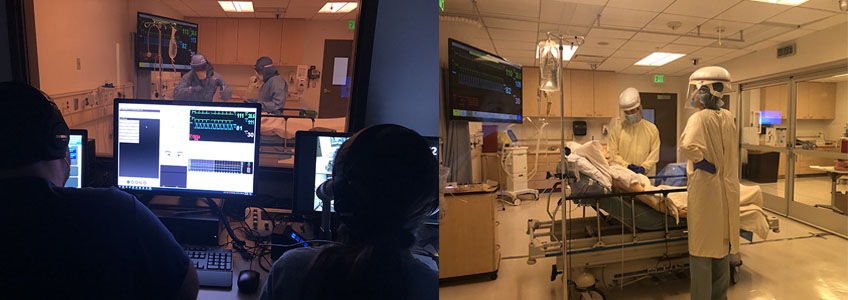About Us
The UCLA Simulation Center is located across the street from Ronald Reagan UCLA Medical Center at 700 Westwood Plaza. We share a beautiful high-tech home with the Center for Advanced Surgical & Interventional Technologies (CASIT) in Rosenfeld Hall, which opened in 2023.
The UCLA Simulation Center gratefully acknowledges Eugene and Maxine Rosenfeld, whose generosity has helped UCLA maintain its role as a leader in simulation-based training. UCLA was among the first institutions to integrate simulation technology and techniques, which has now become a standard for medical education, surgical training, and healthcare team training. These programs lead to skills mastery, improved performance, quicker response time, and more coordinated teams. Healthcare simulations provide experiential learning to develop trainee confidence and competence, improving patient safety and resulting in cost and process efficiencies. UCLA's simulation training programs have grown steadily to meet a growing list of educational programs within the David Geffen School of Medicine at UCLA and its affiliated partners and health sciences schools, thanks in large part to the vision and commitment of Maxine and Gene.

Mission, Vision, Values and Goals
Our mission is to leverage simulation, teamwork, technology, innovative research, and best practices to improve patient outcomes and healthcare education.
Our vision is to create a safer, kinder and more equitable health system through simulation experiences.
Our values are aligned with the DGSOM Cultural North Star and UCLA Health core values.
- Our actions, words and behaviors are guided by our Cultural North Star: Do what’s right. Make things better. Be kind.
- We practice Compassion, Respect, Excellence, Discovery, Integrity, Teamwork and Service (CREDITS) through constructive feedback, curiosity and continuous quality improvement in a psychologically safe environment.
Our goals include:
- Aligning with health system quality improvement initiatives (MOVERS*) through in situ simulations, patient safety projects and community partnerships.
- Providing high value simulation training for clinical and team skills, including communication training on topics such as difficult conversations, anti-racism, equity, diversity, inclusion, microaggression mitigation, civility, and humanism.
- Conducting research and exploring innovations to advance educational strategies and scholarly contributions.
- Leading organizational performance through resource optimization, transparent processes, financial sustainability, equity, work-life balance, and talent retention.
- Creating a collaborative learning organization with a kind culture and clear expectations focused on teamwork and professional development.
*MOVERS: Morbidity, Outcomes, Value, Experience, Readmission, Safety
